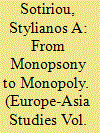|
|
|
Sort Order |
|
|
|
Items / Page
|
|
|
|
|
|
|
| Srl | Item |
| 1 |
ID:
190094


|
|
|
|
|
| Summary/Abstract |
This article explores the extent to which the observable characteristics of political leaders influence the magnitude of electoral personalisation in the new democracies of Central and Eastern Europe. Using CSES data, it analyses 18 legislative elections spanning 16 years of postcommunism, providing strong evidence that personalisation is relevant and widespread in the region and arguing that the electoral context is relevant for how leader characteristics affect personalisation. Some characteristics stimulate leader effects (age, executive experience, tenure as party chair), while others confine them (being an anti-communist dissident), have ambiguous (being a former communist leader) or no effects (gender, incumbency, time in office).
|
|
|
|
|
|
|
|
|
|
|
|
|
|
|
|
| 2 |
ID:
190097


|
|
|
|
|
| Summary/Abstract |
Academia, in much of the world, has long been disproportionately populated by men. This pattern, at least in the social sciences, may be changing. We explore the shifting gender gap in political science in Kazakhstan, and then set out to explore potential determinants of the changes as well as the resulting employment patterns. We use time-series data to demonstrate that a rising GDP, shifting fertility rates, occupational prestige and a growing population are related to the increase in the number of women entering political science in Kazakhstan, which, nevertheless, has not resulted in employment parity.
|
|
|
|
|
|
|
|
|
|
|
|
|
|
|
|
| 3 |
ID:
190092


|
|
|
|
|
| Summary/Abstract |
In the 2000s the Belarusian regime appeared adept at developing appropriate methods for countering external democratisation efforts and was even a model for other post-Soviet autocracies. To cope with ever-changing internal and external environments, the regime honed the methods of adaptive authoritarianism. However, this article shows that the Belarusian system is fragile and failing by using a framework that analyses various aspects of adaptive authoritarianism, including performance legitimacy, personalist rule, neopatrimonialism, managed pluralism and coercive capacity.
|
|
|
|
|
|
|
|
|
|
|
|
|
|
|
|
| 4 |
ID:
190093


|
|
|
|
|
| Summary/Abstract |
The completion of the natural gas pipeline ‘Power of Siberia’ in 2019 creates new dynamics in Eurasian trade. Russia’s deepening ties with China present it with the opportunity to change its relationship with the European Union from monopsony to monopoly, thus gaining bargaining leverage. However, this argument goes both ways, being also applicable to Russo–Chinese affairs, with the European Union as the alternative option. The article concludes that Russia, while seriously strengthened by its developing energy relationship with China, will not endanger its status as a reliable supplier across Eurasia, since its nascent monopoly position depends on the existence of an alternative option.
|
|
|
|
|
|
|
|
|
|
|
|
|
|
|
|
| 5 |
ID:
190096


|
|
|
|
|
| Summary/Abstract |
Political elites continue to instil notions of fear of the Other in Bosnia & Hercegovina (BiH), which could lead to renewed violence in a context of growing socio-economic and political instability. Considerable literature on BiH indicates that more should have been done to foster reconciliation between the antagonists. The purpose of this article is to clarify the relationship between trust, a crucial element of reconciliation, and identity. Based on a series of semi-structured interviews conducted in BiH, this article also seeks to deepen our understanding of significant factors to consider for building trust through an incremental process.
|
|
|
|
|
|
|
|
|
|
|
|
|
|
|
|
| 6 |
ID:
190095


|
|
|
|
|
| Summary/Abstract |
This article addresses the myth-making narratives of the Great Patriotic War in Kaliningrad Oblast’ in the Russian Federation. The myth of the war became one of the key elements of Russia’s politics of memory, serving as a tool of legitimisation for the authoritarian regime and a source of Russian national pride and patriotism. However, the regional version of this discourse is more than merely a historical narrative imposed by central power structures. The war serves as a foundational myth of Soviet Kaliningrad, which replaced German Königsberg in 1946. As such, it validates the presence of the postwar migrant community on the formerly German territory and frames the identity formation process.
|
|
|
|
|
|
|
|
|
|
|
|
|
|
|
|
| 7 |
ID:
190098


|
|
|
|
|
| Summary/Abstract |
At a particular strategic moment (1918–1919) during World War I, British agents became involved in the politics of Transcaspia, a region then governed by an uneasy coalition of Russian railway workers and Turkmen tribes. This article argues that this ‘Transcaspian Episode’ is a manifestation of a global process of imperial disintegration and the nationalisation of colonial territory with ambivalent external sponsorship. It reveals the role of the British in influencing the fate of Turkmen autonomy and provides an opportunity to contrast the British and Bolshevik treatments of colonised peoples during and after World War I.
|
|
|
|
|
|
|
|
|
|
|
|
|
|
|
|
|
|
|
|
|